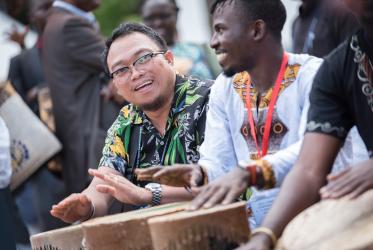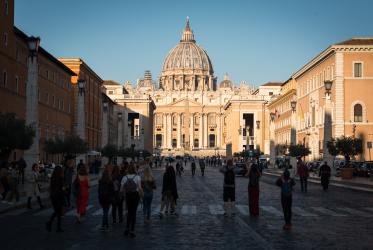Life on earth is characterized by borders in many ways. In this regard, borders have an ambiguous purpose: they separate lands and countries and they define restrictions for action, but they can also help for protection and guidance. The last definite border to every life is death. But the very fact that Christ “trampled down death by death” shows that even this border can be removed and will be removed by the will of God.
On this background, the Global Ecumenical Theological Institute programme with its thematic tracks wants to unfold the different aspects and possibilities for the move and removal of borders in different areas of Christian life in ecumenical perspective.
One of the most crucial areas for the separations between Christians is history (historic-theological track). This is true for geographical borders, which are generally at the same time political borders. But it is also true for invisible borders such as cultural differences, different mind sets, etc. Most of the differences that divide the churches have their roots in history and in the wounds the churches have inflicted on each other throughout history. Therefore, the removal of borders in this area has substantially to do with reconciliation through the healing of memories.
The city of Karlsruhe is located at the border between Germany and France – the history of which gives an excellent example for a successful reconciliation between two countries which had been archenemies for ages until the 20th century. Global Ecumenical Theological Institute students will also study the case of South Africa after apartheid and discuss the necessity for reconciliation in the case of Ukraine and Russia after a hopefully soon end of the war.
The healing of memories is not just necessary in view of wounds within societies, but also between churches which condemned each other as heretics leading to mutual persecution and war in the past. Examples for study are the relations between the Roman Catholic Church and the Lutherans or the Lutherans and the Mennonites.
Going beyond the borders existing between Christians we have also to consider the other existing religions and our relationship with them (intercultural-interreligious track). Religious plurality is a phenomenon in all societies. It is related to migration and globalisation. This is a new challenge, especially for churches in societies which have been for a long time a majority in their context, as it is the case in many countries in Europe.
Already in the Old Testament a central concern of Jahwe is the care for the poor and marginalised. This has been developed further in the New Testament and taken up by Jesus Christ in his healing activities and his standing at the side of persecuted persons. Therefore, the diaconical dimension (practical-diaconical track) was an aspect of the church from its beginning on. In a globalised world this includes the removal of borders between rich and poor, between privileged and underprivileged, between white and black, between North and South, between indigenous people and colonisers, between disabled persons and others.
A very specific area where borders need to be removed is the question of justice and human rights (just-relations track). Gender justice and questions related to racism are just some of the issues to be discussed and studied in this field. The location of the Global Ecumenical Theological Institute in Karlsruhe gives the opportunity to discuss related questions with lawyers of the German Supreme Court.
‘Oikoumene’ means “the whole inhabited earth.” Therefore the question of reconciliation is not just related to human beings, but to the whole creation (eco-theological track). It is almost a truism that it is the anthropocentrism of human beings which is in big parts guilty for the ecological disasters of the last century and the disasters we are and will be facing in this century. That this anthropocentrism was nurtured by the Bible and especially the Old Testament history of creation is shameful. It is high time for a metanoia: a renewal of the moral vision in view of the ecological crisis is indispensable.







